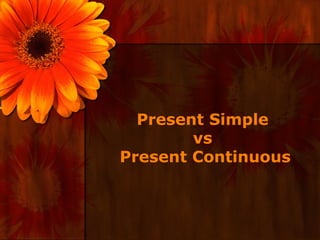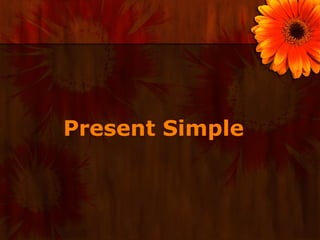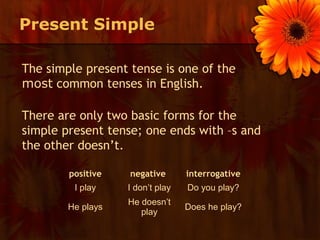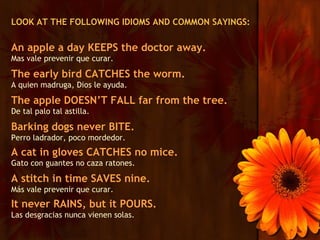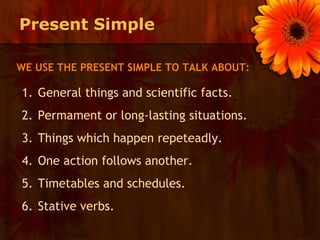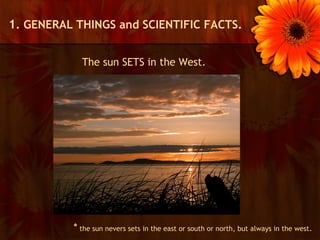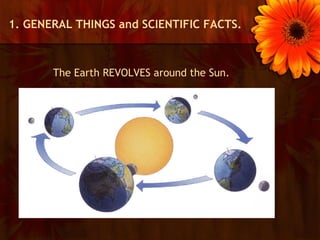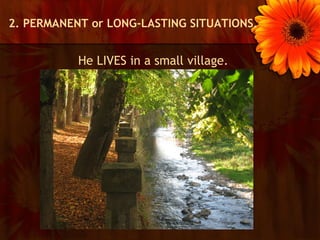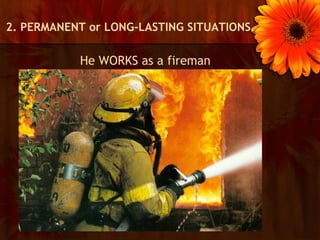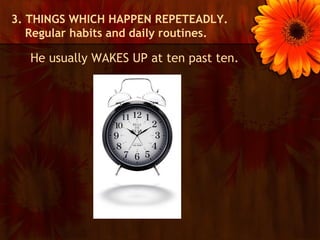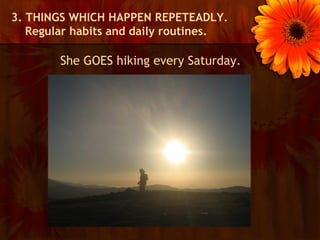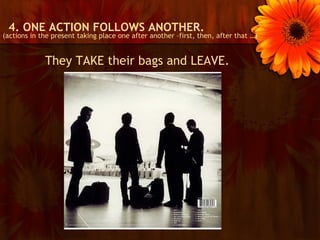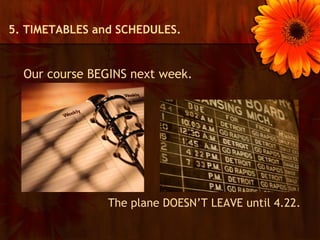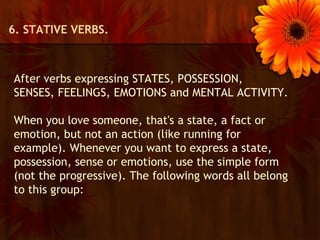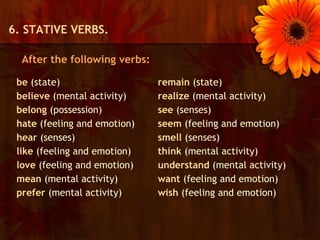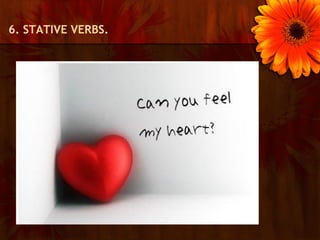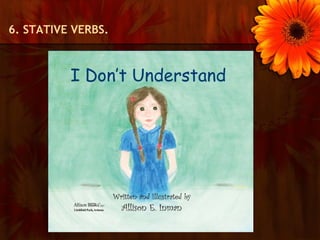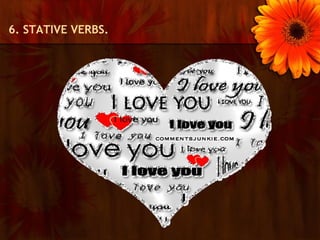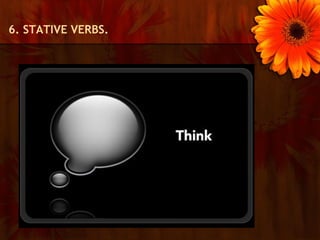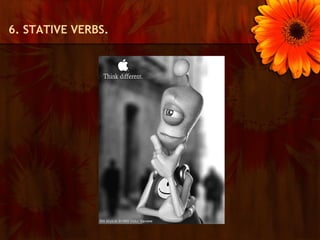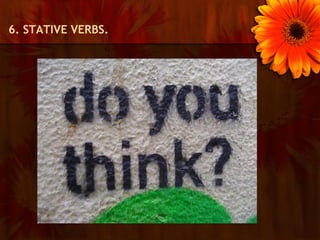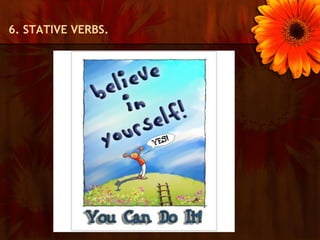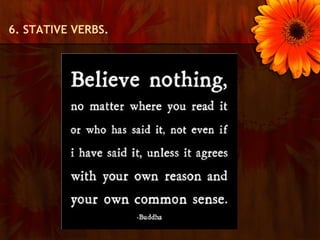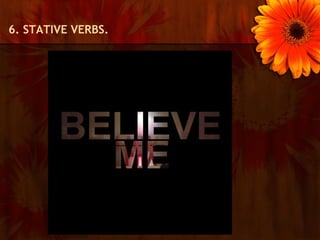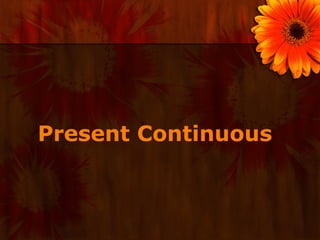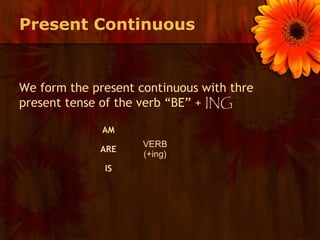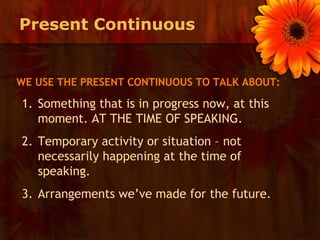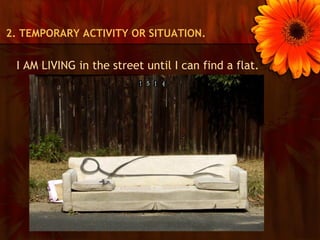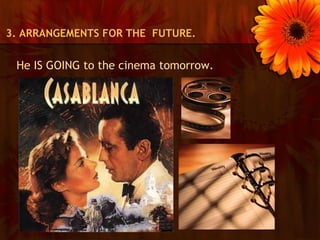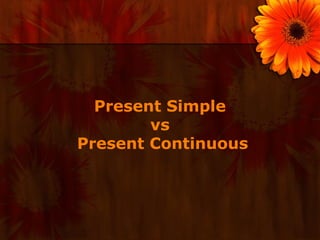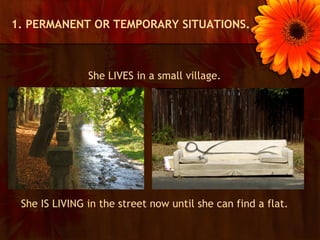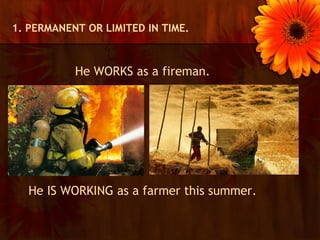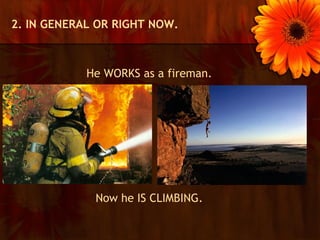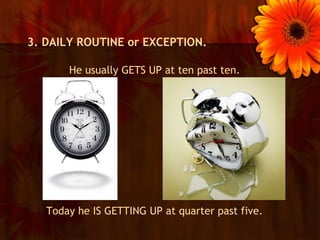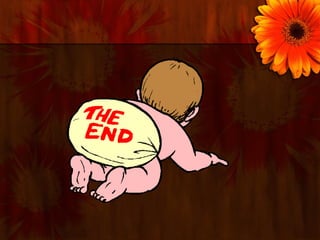Present simple vs present continuous
- 1. Present Simple vs Present Continuous
- 3. Present Simple The simple present tense is one of the most common tenses in English. There are only two basic forms for the simple present tense; one ends with ŌĆōs and the other doesnŌĆÖt. positive negative interrogative I play I donŌĆÖt play Do you play? He doesnŌĆÖt He plays Does he play? play
- 4. LOOK AT THE FOLLOWING IDIOMS AND COMMON SAYINGS: An apple a day KEEPS the doctor away. Mas vale prevenir que curar. The early bird CATCHES the worm. A quien madruga, Dios le ayuda. The apple DOESNŌĆÖT FALL far from the tree. De tal palo tal astilla. Barking dogs never BITE. Perro ladrador, poco mordedor. A cat in gloves CATCHES no mice. Gato con guantes no caza ratones. A stitch in time SAVES nine. M├Īs vale prevenir que curar. It never RAINS, but it POURS. Las desgracias nunca vienen solas.
- 5. Present Simple WE USE THE PRESENT SIMPLE TO TALK ABOUT: 1. General things and scientific facts. 2. Permament or long-lasting situations. 3. Things which happen repeteadly. 4. One action follows another. 5. Timetables and schedules. 6. Stative verbs.
- 6. 1. GENERAL THINGS and SCIENTIFIC FACTS. The sun SETS in the West. * the sun nevers sets in the east or south or north, but always in the west.
- 7. 1. GENERAL THINGS and SCIENTIFIC FACTS. The Earth REVOLVES around the Sun.
- 8. 2. PERMANENT or LONG-LASTING SITUATIONS. He LIVES in a small village.
- 9. 2. PERMANENT or LONG-LASTING SITUATIONS. He WORKS as a fireman
- 10. 3. THINGS WHICH HAPPEN REPETEADLY. Regular habits and daily routines. He usually WAKES UP at ten past ten.
- 11. 3. THINGS WHICH HAPPEN REPETEADLY. Regular habits and daily routines. She GOES hiking every Saturday.
- 12. 4. ONE ACTION FOLLOWS ANOTHER. (actions in the present taking place one after another ŌĆōfirst, then, after that ŌĆ”) They TAKE their bags and LEAVE.
- 13. 5. TIMETABLES and SCHEDULES. Our course BEGINS next week. The plane DOESNŌĆÖT LEAVE until 4.22.
- 14. 6. STATIVE VERBS. After verbs expressing STATES, POSSESSION, SENSES, FEELINGS, EMOTIONS and MENTAL ACTIVITY. When you love someone, that's a state, a fact or emotion, but not an action (like running for example). Whenever you want to express a state, possession, sense or emotions, use the simple form (not the progressive). The following words all belong to this group:
- 15. 6. STATIVE VERBS. After the following verbs: be (state) remain (state) believe (mental activity) realize (mental activity) belong (possession) see (senses) hate (feeling and emotion) seem (feeling and emotion) hear (senses) smell (senses) like (feeling and emotion) think (mental activity) love (feeling and emotion) understand (mental activity) mean (mental activity) want (feeling and emotion) prefer (mental activity) wish (feeling and emotion)
- 27. Present Continuous We form the present continuous with thre present tense of the verb ŌĆ£BEŌĆØ + ING AM VERB ARE (+ing) IS
- 28. Present Continuous WE USE THE PRESENT CONTINUOUS TO TALK ABOUT: 1. Something that is in progress now, at this moment. AT THE TIME OF SPEAKING. 2. Temporary activity or situation ŌĆō not necessarily happening at the time of speaking. 3. Arrangements weŌĆÖve made for the future.
- 29. 1. AT THE TIME OF SPEAKING. She IS READING a book now.
- 30. 2. TEMPORARY ACTIVITY OR SITUATION. I AM LIVING in the street until I can find a flat.
- 31. 3. ARRANGEMENTS FOR THE FUTURE. He IS GOING to the cinema tomorrow.
- 32. Present Simple vs Present Continuous
- 33. 1. PERMANENT OR TEMPORARY SITUATIONS. She LIVES in a small village. She IS LIVING in the street now until she can find a flat.
- 34. 1. PERMANENT OR LIMITED IN TIME. He WORKS as a fireman. He IS WORKING as a farmer this summer.
- 35. 2. IN GENERAL OR RIGHT NOW. He WORKS as a fireman. Now he IS CLIMBING.
- 36. 3. DAILY ROUTINE or EXCEPTION. He usually GETS UP at ten past ten. Today he IS GETTING UP at quarter past five.
Editor's Notes
- #2: Title Page Below are some simple instructions on how to use this template: 1. You can change the text in the graphical screen above or in the outline area to the left. 2. There is one default background that is indicated by ŌĆ£--------ŌĆØ .This slide acts as a space or a blank screen, use to clear or blank the screen. If you have a large graphic such as a map you could also use this screen. If you insert a new slide you will get this default background. 3. The first five slides have the other backgrounds for the set. To use more than one of these background types in your presentation highlight the one you wish to use and choose copy from the edit menu. Paste this slide where you want it to appear in your presentation, then change the text on this new slide. By copy/pasting the slide in this manor you will keep the background, text formatting and the customized animation from that slide. By using the copy/paste method you find it saves you time and keeps a consistent look through out your presentation. 4.There are a few additional notes written in the slide text wording that may be helpful. Please visit blog.imagevine.com for more information.
- #3: Title Page Below are some simple instructions on how to use this template: 1. You can change the text in the graphical screen above or in the outline area to the left. 2. There is one default background that is indicated by ŌĆ£--------ŌĆØ .This slide acts as a space or a blank screen, use to clear or blank the screen. If you have a large graphic such as a map you could also use this screen. If you insert a new slide you will get this default background. 3. The first five slides have the other backgrounds for the set. To use more than one of these background types in your presentation highlight the one you wish to use and choose copy from the edit menu. Paste this slide where you want it to appear in your presentation, then change the text on this new slide. By copy/pasting the slide in this manor you will keep the background, text formatting and the customized animation from that slide. By using the copy/paste method you find it saves you time and keeps a consistent look through out your presentation. 4.There are a few additional notes written in the slide text wording that may be helpful. Please visit blog.imagevine.com for more information.
- #4: Sample Verse Layout Type 1
- #5: Sample Verse Layout Type 2
- #7: Sample Verse Layout Type 1
- #8: Sample Verse Layout Type 1
- #9: Sample Verse Layout Type 1
- #10: Sample Verse Layout Type 1
- #11: Sample Verse Layout Type 1
- #12: Sample Verse Layout Type 1
- #13: Sample Verse Layout Type 1
- #14: Sample Verse Layout Type 1
- #15: Sample Verse Layout Type 1
- #16: Sample Verse Layout Type 1
- #17: Sample Verse Layout Type 1
- #18: Sample Verse Layout Type 1
- #19: Sample Verse Layout Type 1
- #20: Sample Verse Layout Type 1
- #21: Sample Verse Layout Type 1
- #22: Sample Verse Layout Type 1
- #23: Sample Verse Layout Type 1
- #24: Sample Verse Layout Type 1
- #25: Sample Verse Layout Type 1
- #26: Sample Verse Layout Type 1
- #27: Title Page Below are some simple instructions on how to use this template: 1. You can change the text in the graphical screen above or in the outline area to the left. 2. There is one default background that is indicated by ŌĆ£--------ŌĆØ .This slide acts as a space or a blank screen, use to clear or blank the screen. If you have a large graphic such as a map you could also use this screen. If you insert a new slide you will get this default background. 3. The first five slides have the other backgrounds for the set. To use more than one of these background types in your presentation highlight the one you wish to use and choose copy from the edit menu. Paste this slide where you want it to appear in your presentation, then change the text on this new slide. By copy/pasting the slide in this manor you will keep the background, text formatting and the customized animation from that slide. By using the copy/paste method you find it saves you time and keeps a consistent look through out your presentation. 4.There are a few additional notes written in the slide text wording that may be helpful. Please visit blog.imagevine.com for more information.
- #28: Sample Verse Layout Type 1
- #33: Title Page Below are some simple instructions on how to use this template: 1. You can change the text in the graphical screen above or in the outline area to the left. 2. There is one default background that is indicated by ŌĆ£--------ŌĆØ .This slide acts as a space or a blank screen, use to clear or blank the screen. If you have a large graphic such as a map you could also use this screen. If you insert a new slide you will get this default background. 3. The first five slides have the other backgrounds for the set. To use more than one of these background types in your presentation highlight the one you wish to use and choose copy from the edit menu. Paste this slide where you want it to appear in your presentation, then change the text on this new slide. By copy/pasting the slide in this manor you will keep the background, text formatting and the customized animation from that slide. By using the copy/paste method you find it saves you time and keeps a consistent look through out your presentation. 4.There are a few additional notes written in the slide text wording that may be helpful. Please visit blog.imagevine.com for more information.
- #34: Sample Verse Layout Type 1
- #35: Sample Verse Layout Type 1
- #36: Sample Verse Layout Type 1
- #37: Sample Verse Layout Type 1
- #38: Sample Verse Layout Type 1

